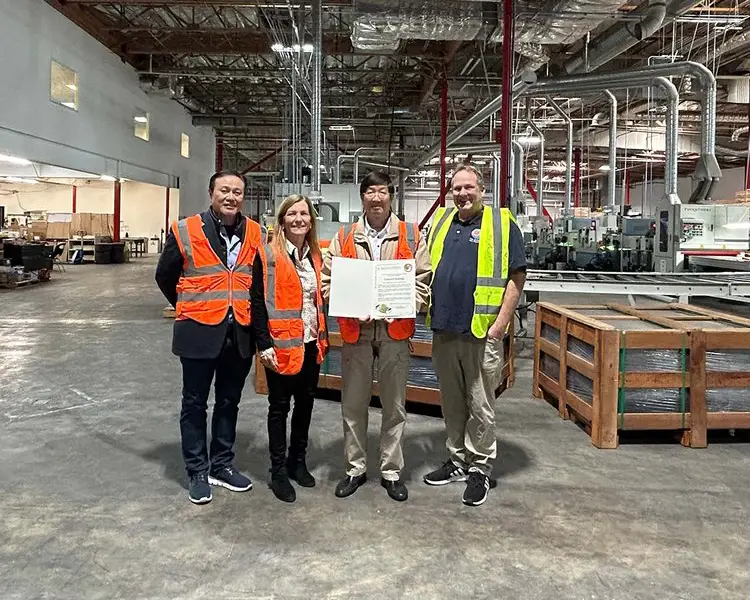Sentenced for Illegal Importation and Sale of Plywood
Sentenced for Illegal Importation and Sale of Plywood
Homeland Security will enforce the illegal import and sale of plywood.
Florida conspirators have each been sentenced to nearly five years in prison for evading over million in duties through the illegal importation and sale of plywood.

Illegal importation and sale of plywood is a direct violation of the Lacey Act. (The Lacey Act combats illegal trafficking of wildlife, fish, and plants.)
Read the full story:
A Florida husband and wife, Noel and Kelsy Hernandez Quintana, were both sentenced yesterday to 57 months in prison for illegally importing and selling between $25 million and $65 million worth of plywood products in violation of the Lacey Act and customs laws.
Their employee, Marta Angelbello, was also sentenced. In addition to their prison sentences, the Quintanas were ordered to pay, jointly and severally, $42,417,318.50 in forfeitures, as well as $1,630,324.46 in storage costs incurred by the government when the Quintanas declined to abandon illegal wood seized by the government, thus forcing the government to maintain the wood in storage pending resolution of the case. The Quintanas were also ordered to serve three years of supervised release following their prison sentences. During that time, they are prohibited from engaging in business regarding importing or exporting products specifically protected under the Lacey Act.
Angelbello was sentenced to three years of probation, including 90 days in home detention, and was ordered to pay a fine of $3,000.
Custom Laws Violation
“Illegal timber trafficking has serious environmental effects. Also, accurate plant import declarations protect domestic producers from dumping by foreign countries and detect potential over-harvesting and trade in timber from high-risk sources,” said Assistant Attorney General Todd Kim of the Justice Department’s Environment and Natural Resources Division. “This case clearly illustrates the ties between natural resource crime and customs laws and is the result of excellent investigative work by customs officers, import specialists, and Homeland Security Investigations.”
“The enforcement of customs laws serves an integral part of U.S. foreign policy and trade policy,” said U.S. Attorney Markenzy Lapointe for the Southern District of Florida. “In this case, the defendants undermined U.S. policy by evading legally mandated customs duties on plywood manufactured in China using Russian timber. Moreover, by doing so, the defendants covered up their criminal scheme to violate federal environmental law while also unjustly enriching themselves.
“Homeland Security Investigations is committed to pursuing individuals or entities that attempt to defraud the government of millions of dollars, violate U.S. Customs laws and undermine a fair marketplace for businesses,” said Special Agent in Charge Anthony Salisbury of the Homeland Security (HSI) Miami Field Office. “These types of criminal activities only serve to negatively impact the U.S. economy and we will continue to work with our federal law enforcement partners to combat this illicit activity.”
According to court filings, the Quintanas and Angelbello together engaged in a sophisticated scheme to evade antidumping and countervailing duties owed on hardwood plywood products made in China by falsely declaring the species, country of origin, or country of harvest of the wood from which the plywood was made and imported.
At times, they shipped plywood containers from China to Malaysia or Sri Lanka, where the wood was taken out of the original containers and put into a second set of containers to conceal the Chinese origin of the product. The Quintanas incorporated seven companies in the United States – naming relatives or friends as corporate officers and agents – and used these shell companies to import hundreds of shipments of plywood products into the United States between February 2016 and December 2020.
The Quintanas also incorporated a financial shell company through which they accepted payments from purchasers for the plywood they imported in violation of law, including the Lacey Act and customs laws. When importing plant products, the Lacey Act requires filing a declaration that contains, among other things, the plant’s scientific name and its country of harvest.
“When importing plant products, the Lacey Act requires filing a declaration which contains, among other things, the plant’s scientific name and its country of harvest. The Lacey Act makes it unlawful to transport or sell a plant product knowing it or the plant it was made from was transported in violation of any plant-related law. Customs laws prohibit false statements in any import declaration without reasonable cause to believe the truth of such statement. It is also illegal to import merchandise contrary to law, including the Lacey Act.”
“According to the Quintana’s October plea agreement, softwood plywood – regardless of country of export – carried a general duty of 8%, with a few duty-free exceptions, such as if the outer ply was made from Parana pine. Antidumping and countervailing duties of more than 200% applied to hardwood plywood manufactured in China after approximately April 2017.”
Before April 2017, the Quintana’s shell companies imported plywood containers into the United States and almost exclusively declared them hardwood plywood imported from China. However, after April 2017, the companies evaded applicable duties by falsely declaring their hardwood plywood imports from China to be either the product of another country or made with a species of wood not subject to duties.
For example, a declaration from July 2018 said plywood in three containers was manufactured in Russia. But the containers were manufactured and loaded in Qingdao, China, and transported to Port Everglades, Florida, through the Panama Canal, without ever stopping in Russia.
“After federal authorities stopped such a shipment through Panama, the Quintanas used a different tactic to evade duties by shipping Chinese-produced hardwood plywood to Malaysia and transferring the wood to new containers to be shipped onward to the United States. This change of containers was intended to better conceal that the plywood originated from China.”
The Quintana also falsely declared some shipments of softwood plywood to be duty-free Parana pine, which allowed them to evade the 8% general duty on these imports. Additional court filings reflect that, after being alerted to the possibility of prosecution for their illegal acts, the Quintanas fled the United States initially to Panama and then to Montenegro, where they were the subject of extradition proceedings.
The pair admitted to conspiring to import hardwood plywood, breaching the Lacey Act and customs regulations, and conspiring to vend the unlawfully imported plywood. Additionally, Noel Quintana pleaded guilty to smuggling and importing plant products without submitting a declaration, which should have included the plants’ scientific name and country of origin.
Kelsy Quintana also pleaded guilty to two counts of importing plant products without filing a declaration, including the scientific name and name of the country where the plants were harvested.
HSI investigated the case with support from Customs and Border Protection, the U.S. Fish and Wildlife Service, and the Animal and Plant Health Investigation Service.
Attorneys from the Environment and Natural Resources Division’s Environmental Crimes Section and the U.S. Attorney’s Office for the Southern District of Florida prosecuted the case.
Share this article
Follow us
A quick overview of the topics covered in this article.
Latest articles
May 18, 2024
May 18, 2024




